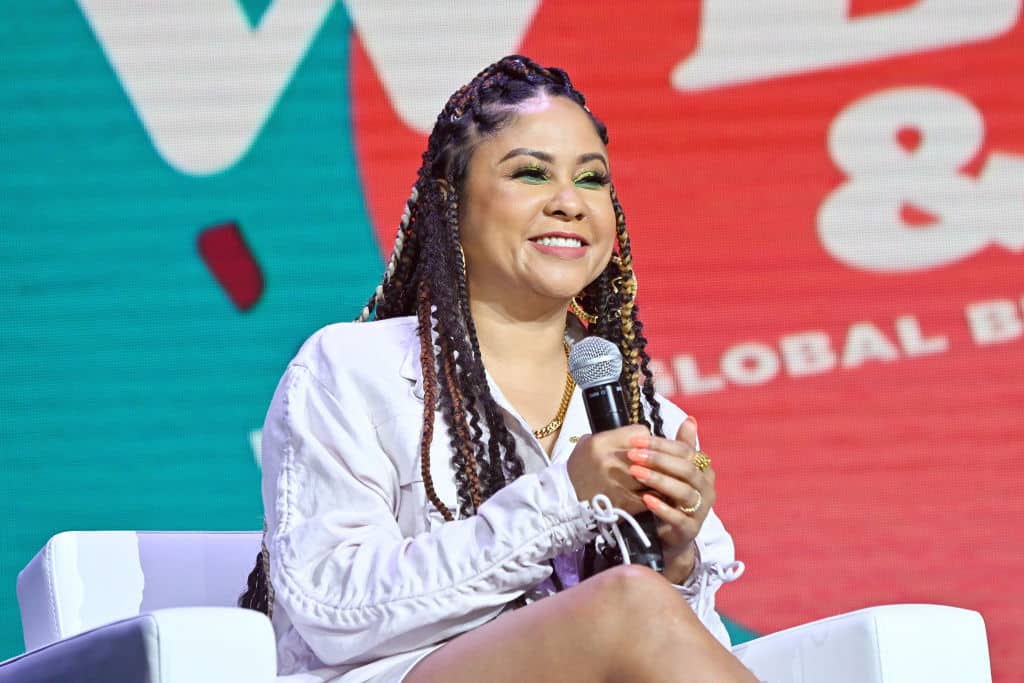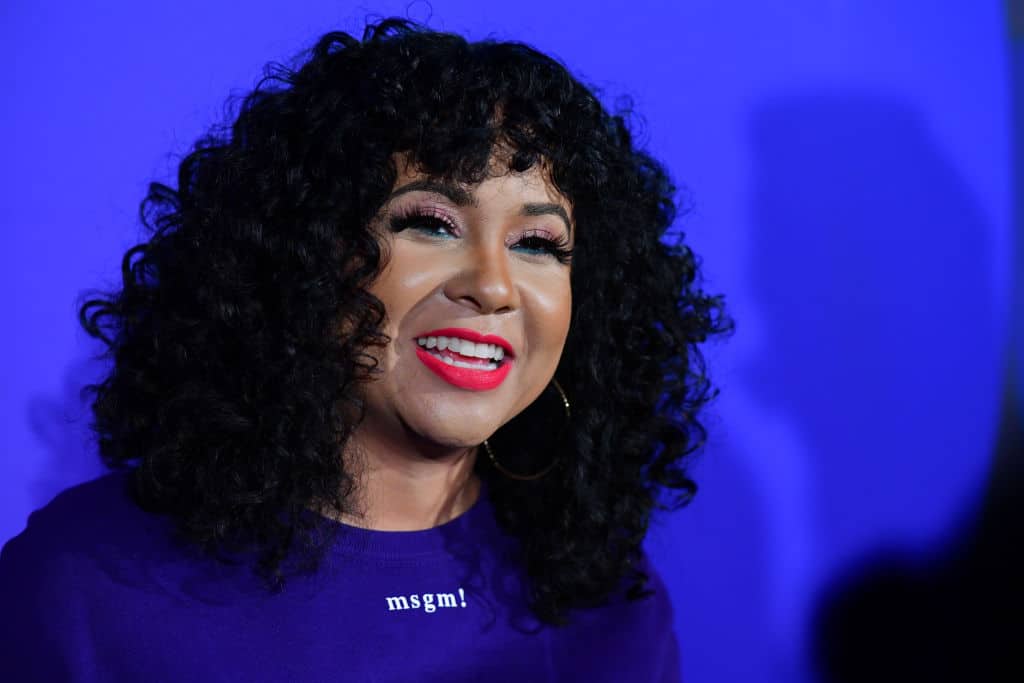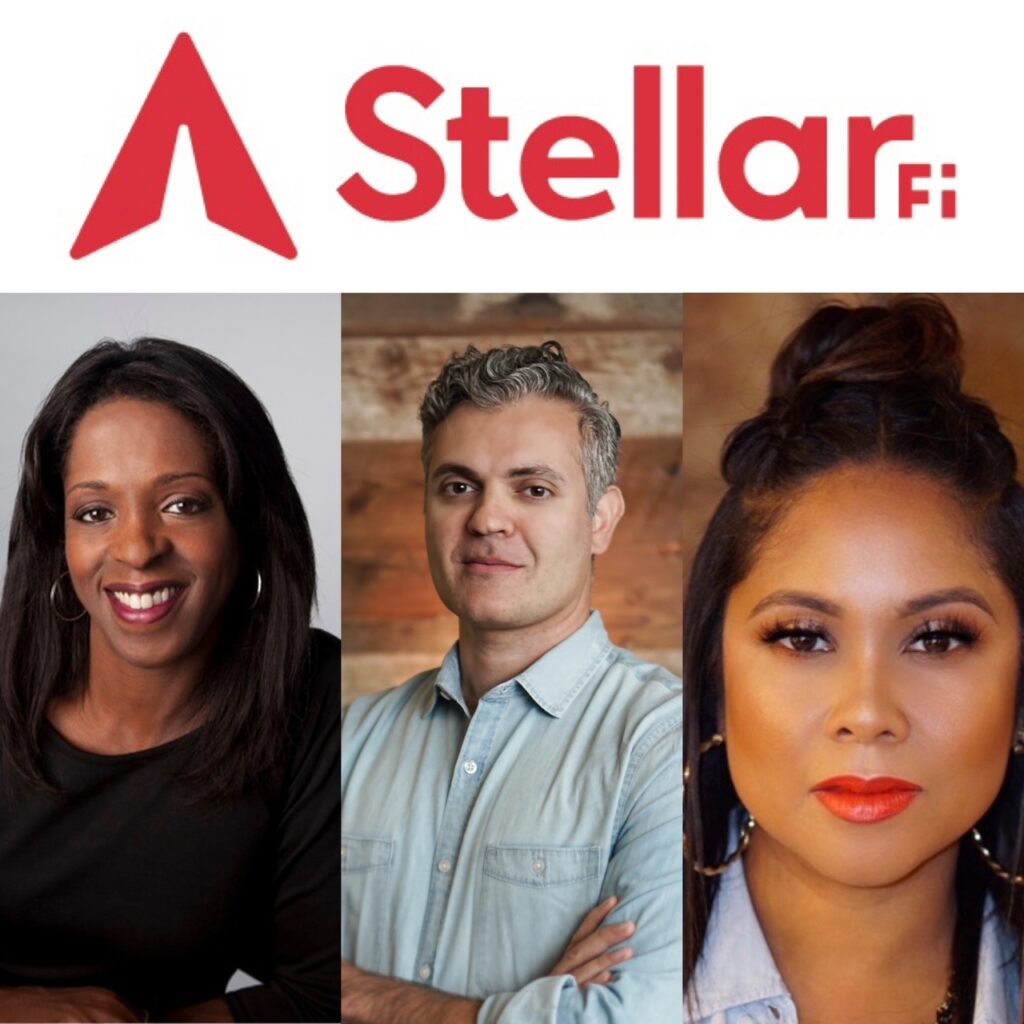
*We caught up with “The Breakfast Club” co-host and passionate financial literacy educator Angela Yee to dish about the launch of StellarFi, a public benefit corporation where she is a founding partner with Lamine Zarrad and Stacey Tisdale that aims to disrupt the U.S. poverty cycle and improve financial literacy by opening access to credit to the 132 million Americans who currently have poor credit or no credit.
“The platform empowers users to increase their credit scores using their everyday bill payments such as rent and utilities, which StellarFi reports directly to Experian, Equifax and TransUnion,” according to a press release. They already have 40,000+ consumers on the waitlist. To kick off the launch, Angela, Lamine and Stacey will host a ‘5 Day Credit Challenge’ that offers info and resources on credit discrimination & bias, setting financial goals, checking your credit score, and devising a bill payment plan, etc.
Check out our conversation below with Ms. Yee about credit-building tips and how you can get involved with StellarFi’s ‘5 Day Challenge’ that kicks off today.
OTHER NEWS: Rapper Remy Ma Empowers Women, Dishes on her 14-year Marriage & Tough Childhood | EURexclusiveWATCH
View this post on Instagram
Talk about the inspiration behind StellarFi and what you and your partners hope to accomplish with this new initiative.
Angela Yee: Well, for myself, working with Stacey Tisdale, we had created Wealth Wednesdays. And we started over five years ago, when we were doing these free monthly Wealth Wednesday talks at my juice bar. Then we started doing things online when the pandemic hit and we couldn’t do it in person. But the whole point of it was just to bring financial knowledge and education into the community.
The juice bar, Juices for Life, is in Brooklyn, so instead of people having to leave and go find these resources, it was nice for us to be able to sit there in person with people and just talk about finances, talk about entrepreneurship. We had the Small Business Services come and bring their RV and let people sign up for classes and for other initiatives on the spot. We had Google come in to talk about Google AdWords and how things like that can help grow your business. We’ve had a lot of different corporations come in. We did a whole thing with Rocket Mortgage about how to buy a home for first-time home buyers.
So everything that we’ve been doing is just basically for free and helping people understand how they can improve their financial situation. Stacey really inspired me when she came on the Breakfast Club, just because the knowledge that she has, and I feel like I’m always growing and learning. I’ve had so many issues myself personally with finances ever since I was young, and a lot of people in my family have struggled with it also, and a lot of people around me. And so I just know things like this can be really empowering, just giving people the tools that they need.
Because we are really great with money, and in particular black people, black women. Black women are the fastest growing group of entrepreneurs and business owners, and so clearly we’re doing something right. And I think people try to make us believe, or we try to make ourselves believe, that we’re not as savvy, but we’ve made a lot happen out of a little and with a lot of obstacles. And so just removing some of those obstacles and giving that education I feel like is going to really push us.

What has been the most significant financial advice you’ve been given, and have you applied it to help improve financial literacy in unrepresented communities?
I think that at different points in my life a lot of things have made an impact. The earliest advice that I got, though, was to start investing in my 401k that my job offered me and to start an IRA. And so the earlier you start doing that, the more that your money, your compounded interest, the more that it will grow as you get older. So the younger, the faster that you do it, the better it is. I didn’t actually do that until I was almost 30-years-old. I wish I would’ve done it earlier, but I think in my head I felt like, “Well, I have all these student loans that I have to pay off. I have all of this debt. I don’t have extra money to invest.”
But when your job is basically doing a match of your 401k, that’s just free money for you. And that’s money that’s pre-taxes that you won’t even notice too much missing out of your check. And so when I started doing that, I feel like that’s what gave me a lot more confidence to feel that I could invest and that I could have money saved up for retirement. And so I think earliest on, that was one of the most important things that I learned. And for some people, they might feel like that I learned that late, but it’s never too late.
And then after that, it was about my credit. I really had poor credit for so long, and so it was an amazing feeling when I was able to get a car. And I didn’t know if I would be able to. I told my father, I was like, “Look, dad, I’m going to get a car today. I’m going to the car dealership. I might need your information, so if I call you, make sure you answer the phone.” Because I don’t know if I’m going to need somebody to cosign. I don’t even think I knew what my credit score was.
And so I remember going into the car dealership, and I didn’t need him. And that was such an amazing feeling to feel the independence of saying, “I can go ahead and get a car without needing somebody to cosign for me.” So that was a sense of relief for me, and that taught me you should know what your credit score is. And you should always be trying to make sure that… Like paying your bills on time. Because before that, I couldn’t even get an apartment without a cosign. And so for me, that was an important, valuable lesson. I used to just not open my bills because I knew I couldn’t pay them. But then when I started being more responsible and having a plan, that’s what really helped me.

As you work with members of the community, are you finding that there are common fears, apprehensions, or maybe misconceptions about building credit?
Some people believe that it’s not good to have credit cards and that it’s not good to owe money, and that you shouldn’t buy something if you don’t have the cash for it. And having no credit is a lot of times worse than having bad credit. And so when it comes to do something like buy a house, it makes it damn near impossible unless you have a million dollars in cash laying around, especially in New York. And so I feel like so many people have told me that and will argue me up and down about why having a credit card is not good and why it’s not good to even have a mortgage.
I also find that some people also have no problem with putting their stuff in other people’s names. And so that’s something that I feel like I’ve heard from for decades now, of people like, “Oh, I just put it in such and such’s name. I’ll put this bill in this person’s name.” And that’s awful to do that to somebody else. And then it’s also just not responsible of you, and if you get caught doing that, that’s fraud. And so we’ve seen a lot of that happening.
So I just feel like the idea that you have to have the cash to pay for everything and that credit doesn’t matter and cash is king, I don’t think that’s the right way of thinking. Even right now for myself, having multiple properties, I don’t have millions and millions of dollars it would take for me to own these all outright. But I am able to buy one thing, use the equity to get something else, take a mortgage here, so I can have that cash to put somewhere else, and invest at the same time and get a return on that money that would be higher than what my interest rate is so you’re still coming out on top.
Tell us about StellarFi’s Five Day Credit Challenge.
Okay, so the first day of the challenge is all about understanding credit bias, and how because of higher interest rates for people who are of the LGBTQ community, black people, Latinx people, indigenous and AAPI communities, a lot of times we lose a lot because of discrimination. We all know about that, the higher interest rates, and also not even being able to get a mortgage sometimes even if we qualify for one. And so that’s a first step of the credit journey that’s day one.
And then day two, what’s your goal? Are you trying to get money to get a new car? Are you trying to save money to buy a house? What is your goal? Are you trying to pay down these bills to improve your credit? It’s important to know what your credit goal is because that’s how you’re going to proceed in building your credit. Different lenders look at different things. There’s different types of FICO scores, depending on what your goal is. And so that’s how you find out what aspect of your credit you have to focus on.
And then the third day is when you link up with StellarFi. There’s a video that’s going to teach you how to set up your StellarFi membership, start building your credit score, and doing all of those things to make everything a lot easier for you.
And then the fourth day is understanding your credit score. There’s 16 versions of the FICO score, which I didn’t even know until I started working on StellarFi. And so you’ll be able to learn and monitor all of those things, because knowledge is the power.
And then day five… And this is one of my favorite things about what it is that we’re doing, is we’re also partnering with the National Foundation for Credit Counseling. So if you sign up for StellarFi, you get free one-on-one credit coaching. And so it’ll show you how to sign up for that so that you not only have good credit, but you also have some counseling, and that is absolutely free.

If folks want to get involved, they should go to the StellarFi website?
Yes, they can go to stellarfi.com. The Fi is for finance, so StellarFi.
Let’s unpack the gender financial gap, what are some of the common contributing factors to this issue?
Well, of course, I think as it’s always been, women make less than men for the same job. And so because of that, sometimes we get higher interest… I mean, it’s a whole snowball effect. Our interest rates will be higher. A lot of times women are the head of the household, especially in particular those numbers are higher for women of color and for black women. And so it makes it a lot harder for us to be able to build credit. And so the harder it is to build credit, the higher your interest rate is going to be, the more you might feel like you’re drowning in debt, and the harder it is to be able to get a house or get a car, do those things that we need to do to build wealth for the next generation and for ourselves. And so it just makes it really difficult.
And then it also, I think just emotionally can really be difficult. I know how hard it was for me. It can be depressing. It can cause anxiety just when you have these financial roadblocks. And it can make you feel really helpless. It can make you embarrassed too. And by the way, more than 40% of employers look at your credit score before they hire you, and so that can also prevent you from getting a job.
What’s your top tip for people who have poor credit or no credit looking to build up their credit?
Don’t ignore it and think it’ll go away. You have to face it. I was the type of person that didn’t open my bills, that was letting them pile up. I mean, that’s something I learned in my own family. That was what I grew up seeing. And so I think it’s really important… The number one thing I would say is know what your situation is so that you can fix it. And sometimes we’re like, “Oh, I can’t do anything about it anyway. I’m not going to pay attention to it.” The amount of anxiety that I had, the feeling that I had of: “I’ll never be able to retire, I’ll never be comfortable. I can’t even go on vacation and pay for this myself,” those things are not a good way to handle it. It’s just a matter of having a plan.
Sometimes you think that you don’t need a counselor or a financial planner because you don’t have any money, but that’s really when you need one. And so go to the experts for help. Don’t feel ashamed or embarrassed. So many of us are struggling with financial issues, but you just got to face it.
And look, another thing that I have to do is sometimes you got to bring in some more money somehow some way and go really hard for a period of time. I had to do that when it was time for me to buy my first house. I took every side gig that I could get. I had my job that was helping me pay my bills, but I didn’t have enough to save for that down payment on my house. And so knowing that I had a goal and at the same time that I was trying to make sure I made a whole lot more money, I also was making sure that I improved my credit.
View this post on Instagram
In your opinion, is there such thing as having too many credit cards?
Well, I think having too many open lines of credit can be a red flag all at once. And I also feel like it depends on how much you owe on them. Because what they look at more than anything is also not… It’s how long you have had those credit cards. So the longer you’ve had them, the better it is, your credit history. But then also how much do you owe? Because they also are going to look at if you owe too much money on those cards, you have them maxed out, you owe 50% of what the limits are on how much you owe, that’s a terrible thing. So if you have a whole lot of credit cards… They tell you you shouldn’t close credit cards either, so if you don’t even have a balance on it, just keep it, don’t use it. Because I do that also, because it also helps establish that long history with a credit card, and if you close it, sometimes it hurts your credit score.
So I would just say I don’t know if opening a whole lot of lines of credit is the way to go. But what’s great about StellarFi is that it’s basically like a… All of your bills that you pay, which can be like your Netflix bill, it could be your rent. Certain things that normally wouldn’t get reported to a credit agency, they’ll get reported to all three of the major credit agencies. And so because you have already so many bills that you pay now, that is what’s going to really help you instead of having to feel like you have to open up all these different lines of credit cards.
When we think about the mission you’re on to improve financial literacy, why is StellarFi the perfect extension for your brand?
I love the fact that I’ve been involved with this from the beginning. I really don’t work with companies that I don’t believe are positive. And this actually is something that I feel like the mission of this is not for them to make money, but it is a public benefit corporation, so that is to help people and help disrupt the U.S. poverty cycle. It’s opening access to credit. There’s a lot of people here who don’t have good credit or who have no credit at all.
And so Lamine, who’s the other founder, I think he has such an amazing, tremendous track record with other businesses that he’s owned and operated, so I trust in him completely. And obviously, Stacey and I have been working together for years now, and so I know how important it is for her to bring this to everybody. This is not for any one person, this is for everyone to be able to use to help improve their credit.
And so for myself, I just am working with people who I believe in and working on a mission that I believe in. I remember the first time I bought my first property, how exciting it was for me and hung up that first chandelier in the living room… There was nothing else in here but the chandelier… And we cried, because it was such an amazing feeling. I never thought I’d be able to own a home, especially not in Brooklyn, a brownstone. And so just that feeling that I had, I understand it. And I understand how life-changing this can be.
And I also have seen the other side of it, how crippling it can be when you’re worried and concerned and anxious about your credit. So that’s really why I feel like this company and StellarFi is amazing. There’s not a lot of things that I do from the ground up like this that I believe in as much as I believe in this, and I’ve been talking, like you said, about financial freedom and about making sure that we’re empowered with these resources. And so sometimes you got to just go all the way for it. So for me, it’s an important venture for me because my name is on it, and I never want to put my name on something that I feel like is not beneficial to people.
We Publish News 24/7. Don’t Miss A Story. Click HERE to SUBSCRIBE to Our Newsletter Now!





